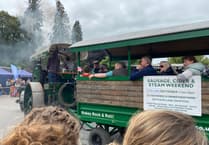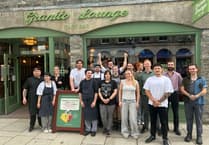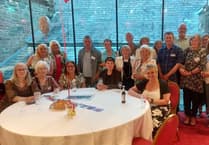ANOTHER refugee from Uganda with fond memories of Plaster Down Camp is Hasmita Sakaria, who was 20 year-old and nine months pregnant on her arrival — she had her baby, Dimple (the name means 'happy' in Hindu), at Freedom Fields Hospital in Plymouth.
Now Hasmita Patel and living in North Greenford, Middlesex, she remembers arriving from Uganda on Sunday, October 15, 1972 at Heathrow Airport on a very cold day.
She told the Times: 'We had a very warm welcome there and we were made to feel at ease, given the frightening experience of having left our own country where the last thing we experienced was the terror of the Ugandan army troops everywhere brandishing guns and firearms.
'After leaving immigration we were put onto a coach bound for Plymouth. All we knew at that stage was that we were heading for an army camp.
'It was a very scary experience for everyone, being in a new country, not knowing what was to come, but especially for a young woman like myself — being nine months pregnant I was feeling very worried.
'I clearly remember the Women's Royal Voluntary Service who were serving tea at the various rest-points along the way. They were all very polite and friendly and greeted us with smiling faces, which helped ease my nerves.'
Her family arrived at Plaster Down Camp in the early hours of October, 17, 1972, on a bitterly cold night.
She said: 'I had never encountered such cold weather in my life and was amazed at the sight of the white blanket of snow or frost covering the camp on the moors.
'We were greeted by officials who checked our documents and passports. One in particular stands out, Miss French. She was very friendly and helped relieve the anxiety I was feeling.
'We were then sent to the medical team where there was a doctor on site who performed all our medical checks and x-rays etc. I recall seeing a sign which read "no x rays for pregnant women", so I let it be known to the doctor that I was expecting.
'After the medical examinations we were taken to the canteen where breakfast was served. This was my first experience of having to queue in a canteen, having a cup of English tea and a bowl of cornflakes.
'We were then shown to the dormitories, and since I was there with my mother and four sisters we were allocated a room for ourselves.
'That afternoon I was seen by a team of doctors, given I was already nine months pregnant. I was rushed to Freedom Fields Hospital in Plymouth where, at 5.30pm I gave birth to my oldest daughter, Dimple Rupal Sakaria. I remember feeling relieved that there were no complications and that she had all ten fingers and toes. She was perfect.
'I had been allocated a health visitor called Mrs P Gearing who was there to help me during and after the birth. She was by my side while I went through labour and the birth. I was kept in the hospital for a month after giving birth and she visited me every day. It was comforting to have a familiar face around during my first days as a new mum.
'When I returned to the camp to show off my little bundle of joy everybody was so excited for me and they had collected clothes and a pram for our newest arrival, all donated by the WRVS.
'The WRVS donated clothes, coats and shoes to all in camp, and we regularly went to their depot to pick up warm clothes, gloves and scarfs etc.
'Mrs Gearing helped me to register the birth of my daughter and also helped with my re-housing. She took me to view a place in Tavistock and had I have taken it I would still have been a resident there, but I did not accept the offer as I did not wish to be separated from my mum and sisters.
'She also took me to her own house and introduced me to her mum, where we had tea and cakes. She made me feel so very welcome and hopeful for my future here.
'We regularly visited the town centre in Tavistock to buy baby clothes where I purchased dresses for just a pound.
'In camp we took it in turns to do cleaning and chores, and I have never forgotten having to wash those Terry nappies, which thankfully are now a long distance memory!
'Every Monday somebody from Social Security would come for us to fill in a form and issue us with a Giro.
'I met other Asians going through the same experience as me throughout my time in camp and as time went on people were being housed and finding jobs, and the camp numbers decreased.
'Some started working in the camp canteen, which meant we were then served with traditional Indian food which brought us a little bit of home.
'In December I had my very first Christmas dinner — a vegetarian version of course.'
Hasmita was moved with the rest of her family to Doniford MoD Camp in Weston-Super-Mare where she stayed for a month before she joined her husband, Dhiru, who had arrived in the UK six months earlier to secure work before the rest of the family arrived. He worked at Whitefriars Glass and the Ford Company. Dhiru had found housing in Harrow Weald, Middlesex. Sadly, he died in 1987.
Hasmita has been living in North Greenford for the last 35 years. Apart from Dimple, who runs a car window tinting and vehicle body wrapping company in Northolt with her partner, Hasmita has two other daughters, Minta and the youngest, Shaila, who has twin boys, aged ten.
FIFTY years ago when Uganda became independent I was a few weeks short of my eighth birthday I had no idea that before my 18th birthday I would be expelled from the country of my birth.
This is a country where three generations of my family had made their home and I had built my hopes. Of the three East African countries, the Uganda of 1962 was regarded as the country with the brightest prospects — it had a well-developed infrastructure, fertile lands and a population that had not been convulsed by conflict.
All this was to shatter — first in 1966 when a constitutional crises led to removal of its president and a system of kings and then in 1971 with the arrival of Idi Amin following a military coup. Amin was initially welcomed, even by the Asian population. But 20 months after that coup Amin launched 'a war of economic liberation' — he decreed that all Asians who were not Ugandan nationals had to leave the country within 90 days. Departing Asians could take with them no more than personal possessions and no cash save for £50.
The decree brought disbelief, shock and confusion for us. Could this all be for real? Where would we go — India or the United Kingdom? What would life be like away from Uganda? The decision was made that we would not choose to go to India but seek refuge in the UK.
My mother's grandfather had left India at the beginning of the 20th century, aged 14, to seek a better life. Western India had been devastated by a famine, he had been orphaned and prospects for employment were bleak to zero. His travel arrangements were basic – working passage on a dhow across the Indian Ocean and, caravan and canoe journey of more than 800 miles across Kenya. He settled in Masaka, the town he would call home right up to his death a year or so before the expulsion.
The Amin decree had completely unsettled my plans – I was in the final term of my A-levels, I had high hopes for success and had dreams of reading law at Makerere University in Uganda. I had made some very good friends and we were all looking forward to the undergraduate life of freedom and experimentation! I half thought that I could still do this because after the initial furore things will settle and no one will bother with little ol' me!
Within days of the decree, stories began to circulate of Asians being jeered at, spat at and even molested in streets and, for some, worse were to follow — all this was just so unbelievable from a people hitherto known for their decency and civility.
Life, post-decree, became quite surreal — we went shopping for suitcases because we did not have enough of these for a family of seven. Suitcases flew off the shelves and prices went up. Warm clothing, already scarce in a tropical country, was like gold dust. Every home was having in effect a table-top sale — what we could not bring to the UK was being sold to convert into cash to buy suitcases for carrying what we could bring out. Each day was a day of parting — someone or other was leaving town, with no idea how and where we will meet again.
'Once our departure date was fixed I saw my Ugandan friends for the last time. I know now that many of the ones left behind did not live through the Amin days. For some time we had a silly craze in our school — we all had autograph books which we would ask only those we liked to inscribe. I still have mine with some poignant messages from those dark days.
The day we left our family home for the last time started with goodbyes to our neighbours who themselves were scheduled to leave in a few days or weeks' time. We travelled 50 miles to Uganda's capital where we lunched with some relatives before taking the final journey to the airport. This nearly 70 miles long trip was marked with five formal and several informal road blocks where all our possessions were rifled by soldiers often drunk and ill disciplined. If they took a shine to something it would have been foolish to argue — money was demanded and paid.
For many it was our first flight but there was no excitement just fear and relief. For much of the journey one could hear sobs and sighs and often outlandish ideas of what life in the UK was going to be like.
We landed at Stansted Airport on October 13 at around 7pm – it was cold. Two images remain with me — the ladies from the Women's Royal Voluntary Service with hot cups of tea and the incredulous sight of white men digging the tarmac. None of us had previously seen the latter sight – white men did not do manual labour where we had come from!
From Stansted we went to East Grinstead in Sussex by coach through London (pre-M25 days) and awestruck by how brightly lit the city was. Excitement and relief now reigned in our coach. London landmarks were spotted with 'oohs and aahs.'
We spent two nights in East Grinstead going by train from East Grinstead to Plymouth — bypassing Paddington.?Years later when I moved to Wandsworth I worked out how this was possible! Uganda is a beautiful country and on this train journey I could see that the English countryside was different, but it too was beautiful.
After arrival at Plymouth we were collected by coaches and taken straight to Plaster Down Camp. By the time we arrived it was late afternoon and was dark. I recall there was a slight drizzle and felt very cold.
On arrival there was a further process of registration before tea and allocation of billets. Each billet was divided into sections with each section demarcated by screens and curtains; every family had one section. There was little privacy but we were in it together — religious and other differences did not matter, we were tied by a bond of dispossession.
The toilet facilities were at one end of each billet and outside the main sleeping area. These were fine to use in the daytime but after nightfall the entrances doubled up as shelters for sheep and we had to frequently dodge them. Women unused to compromising modesty found the communal showers and toilet facilities particularly distressing and we soon worked out an informal male and female rota.
Food was another challenge. The cooks made great efforts to cook something familiar — boiled vegetables seasoned with curry powder was one such attempt. It was not long before some of the women offered to help out to make as good a job as they could of what was available. One so easily forgets that 40 years ago many spices and condiments were exotic and difficult to obtain locally. I also doubt if any of the meat served was halal but it seemed not to matter.
In the following days we lined up outside WRVS rooms for clothing to suit the Dartmoor weather. We were used to rain but not the steady drizzle that lasted what seemed like days, or the driving rain that blew in your face or the freezing rain that chilled bodies to the bone
It was perhaps a week later that several of us were taken to Tavistock Comprehensive School to look around and while there we were enrolled to continue our studies. When I left Uganda I was in the final term of my A-level studies with every expectation that I would get the required grades to go to Uganda's only university at Makerere which had a fine reputation. This interrupted dream was to continue in another place and on to another university. Back in Uganda I had chosen history, English literature, economics and geography – at Tavistock, I continued in all of these except economics but now I was faced with a different period of history, different set books and a different region for the geography studies.
Three key teachers at Tavistock, Mrs Dunne, Mr Charleston and Mr Woodcock, helped make the transition. They and some of the fellow sixth formers were incredibly generous with their time and general guidance and helped settle us.
At school everything was different — the day was long, the journey to school longer than one I was accustomed to, informality of the sixth form was alien, and because we were unlikely to be at the school for long my compatriots and I were excused uniform. We must have stood out. But the warmth and goodwill from all was touching, making the challenges of a new place bearable. Each evening we returned to Plaster Down — from new discoveries at school back to the comfort of a community which, despite its uprooted past, took pride in its young getting on with life.
Some very early exposure to life in the UK came when we were invited to supper and tea at the homes of some local residents. It is difficult to explain how difficult it was to master the art of eating with fork and knife, handling unfamiliar food, tasting alcohol or mixing with female company.
We found we were better read in classics than in current writing, our take on world events and world geography was more sure-footed than that of many fellow students. These contrasts and new experiences perhaps helped familiarise myself with the life that was ahead of me.
Equally important formative experience was how good natured and welcoming the people of Devon had been to us — there was no hint of what we had read in Ugandan papers, which had reported that we were the new pariahs and not welcome in the UK.
Not long after my father found work in Plymouth my family moved there with me staying behind to complete the school term. This was my first experience of independent living. I was soon to join them, and end my studies when I got the required grades to go to university. Between the results and start of university life I had six months. I took a job as a bus conductor on the Western National buses, often plying between Plymouth and Tavistock and once again meeting the people who were familiar from my time in Tavistock and the villages of Horrabridge and Yelverton.
Forty years on I look back with nostalgia and the recent publicity of these events has brought reconnections and a reflection – of all Amin's victims we were fortunate compared to my fellow Ugandan school friends of whom so few survive and none in the land of their birth.
We made a new life abroad and are lionised as among the most successful migrants — that cannot be said for Ugandans who endured a catastrophic decline from which the country has taken decades to recover.



This article has no comments yet. Be the first to leave a comment.